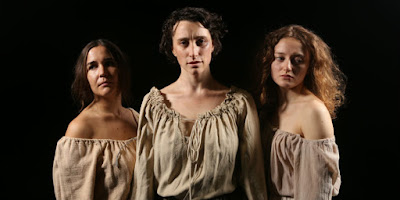 |
| One of the prison hulks at Deptford, 1826, the spire of St Paul's Church, Deptford in the distance |
The opera is based on the play Female Transport by Steve Gooch, a play that Stephen McNeff has known and admired for years. It is about women convicts being transported to Australia, women who had frequently committed only the most minor of crimes. And when McNeff was talking to Hirst about a possible opera, the subject seemed ideal. They felt that the opera would fill what was an extraordinary gap in the repertoire, and would be a real contribution to the repertoire.
McNeff has worked at Trinity Laban before, on projects during the two weeks in February when teaching is suspended and music and dance student collaborate on new material or in a new way on old material. Three years ago McNeff did a project which involved the students going to the Maritime Museum to research the young women who were transported. An experience which made the students realise that there were real people behind the characters, and made them think 'this could have been me'.
The characters in the opera are all named (including the chorus members) and are, in fact, all real people. The opera has other local resonances as the prison hulks where the women were held before transportation were at Deptford and Woolwich. Another strange co-incidence is that the farms in Australia where the women worked after they had been transported are now the site of the Sydney Conservatorium!
 |
| Members of the cast of Banished |
Olivia Fuchs, who as well as directing opera has experience writing libretti, wrote the libretto (read my recent interview with Olivia Fuchs). She directed Britten's A Midsummer Night's Dream at Trinity Laban last year. She explained that the process of writing the text started with conversations about the structure of the piece. The play, which is naturalistic, has far too much text for an opera so Fuchs had to condense and reshape it. She felt that the relationships were the most important feature of the dramaturgy. There was also a somewhat Upstairs Downstairs quality to it with the men upstairs, the captain and the ship's crew, in charge of the women below.
Inevitably the subject resonates with contemporary themes of refugees and the treatment of women, and whilst Fuchs and McNeff were conscious of these links they were also concerned not to hammer them home. For Fuchs, the important feature of the story was the way it brought out the transformation of the human spirit, she also pointed out that the boat could function as a microcosm of how contemporary society worked.
Fuchs had to change a lot of the structure of the play, which meant that had to have conversations with Steve Gooch to convince him that it would not take the work to far from Gooch's original intentions, and that it would work as a real opera rather than simply a play with music.
Linda Hirst explained that new work has always been a vital part of what she has done in her performing career and she continues to love. It was important to her, that the students got the opportunity to work with living composers, people who could talk to you and work with you. It was also a way of showing students that the approach to music written now need not be different to that written earlier, and that learning new music can improve your musical vocabulary.
Also, learning a brand new role is an exciting and interesting challenge. McNeff explained that when students study repertory pieces they inevitably are influenced by past performances, and with the internet it is far easier to hear them. With a new piece you cannot do this, there is no performing history and the singer has to create the role for the first time. This process can inform and teach the students when they return to singing standard repertoire.
We heard a selection of four excerpts from the opera sung by Lucy Bray (Pitty), Katy Huntley (Winnie), Emily Gray (Madge), and Laurence Panter (Captain). Enough to show us that it will be fascinating and intriguing work. And one of the excerpts, Winnie's aria, demonstrated that it 'is not all slow sad music'.
McNeff explained that he had written the piece with young voices in mind, voices that are flexible and have the notes but do not yet have the stamina. So there are few set pieces, and lots of short arioso moments and ensembles, creating very much an ensemble opera.
Banished, a new opera by Stephen McNeff, libretto by Olivia Fuchs, based on the play Female Transport by Steve Gooch
Wednesday 29 June to Saturday 2 July 2016, at Blackheath Halls.
Director: Elaine Kidd
Conductor: Jessica Cottis
Louie Whitmore: DesignFurther information from the Trinity Laban website
Elsewhere on this blog:
- Appealing: Dvorak's concert overtures from Prague - CD review
- Dance into concert: Nimrod Borenstein's Suspended - CD review
- Brasil Brasileiro: Song in the City goes to Brazil - concert review
- Enchanting: Mozart's Don Giovanni from English Touring Opera - Opera review
- Teeming with life: Rimsky-Korsakov's May Night - Opera review
- The transition from dark to light: Director Olivia Fuchs on Mascagni's Iris - interview
- Rare Donizetti brought to vibrant life: Pia de'Tolomei from English Touring opera - Opera review
- Joyful: Handel trio sonatas from the Brook Street Band - Cd review
- Slow burn Brahms: Clare Rutter, Stephen Gadd, City of London Choir in Brahms Requiem - Concert review
- Game of thrones: Handel Ariodante at London Handel Festival - Opera review
- Schnabel is the star: Cello music from Austria-Hungary - CD review
- Making a strong case for a neglected work: Louis Spohr's Die letzten Dinge - concert review
- Home



.jpg)







No comments:
Post a Comment